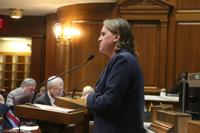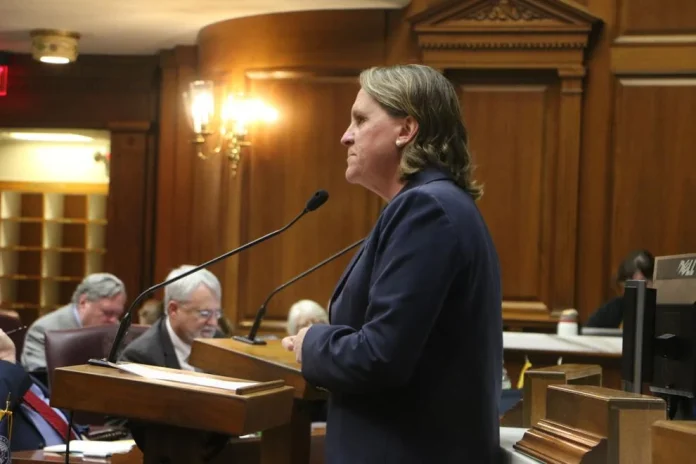Education bill making collective bargaining optional sees tense exchange in House
- By Xain Ballenger, TheStatehouseFile.com
- Â
Tensions reached a boiling point inside the Indiana House Wednesday as Rep. Ed DeLaney, D-Indianapolis, shared a passionate argument against education-related Senate Bill 486 and its provision to make collective bargaining between school districts and teachers optional rather than mandatory.

Rep. Tonya Pfaff, D-Terre Haute, speaks during a hearing of Senate Bill 486 in the House Wednesday. “We teachers are the boots on the ground,” she said.  Photo by Xain Ballenger, TheStatehouseFile.com
Collective bargaining is a process by which people negotiate contracts with their employers, often through unions. DeLaney said the bill is eliminating the requirement to have these discussions and proposed an amendment to delete many lines in the bill.
“What of course happens in the real world is that if you don’t have ongoing discussions, if you don’t treat teachers fairly about things like class size or whatever disciplinary concerns they have, they will fester … They will be angry, ” Delaney said.
Other representatives shared their support for DeLaney’s amendment, including Rep. Pat Boy, D-Michigan City, Rep. Sheila Klinker, D-Lafayette, Rep.Chuck Moseley, D-Portage, and Rep. Tonya Pfaff, D-Terre Haute.
Pfaff referred to her 30 years of teaching.
“We teachers are the boots on the ground. We help the administration to address issues that arise on a daily basis … Taking this away will hurt communication. It will say maybe we can talk later and maybe we can’t,†Pfaff said.
Rep. Jake Teshka, R-South Bend, opposed the amendment, saying that during testimony, legislators heard from members of the Indiana School Board Association and other groups representing educators and administrators and while there were differing opinions on this issue, all of them indicated that these discussions will continue to happen.
“No superintendent worth their salt is going to tell the teacher that they will not discuss with them any concerns that they might have in their building,†Teshka said. He sponsored the bill, which was authored by Sen. Linda Rogers, R-Granger, Sen. Jeff Raatz, R-Centerville, and Sen. Stacey Donato, R-Logansport.
Teshka said that the real idea legislators are getting at is giving locals more flexibility to create their own structure for how these discussions take place, rather than the state’s prescriptive, formal process. He said the bill would help with regulatory relief and that if DeLaney’s amendment were accepted it would defeat the purpose of the bill.
“We are not, as the state legislature, responsible for the bad decisions of a few actors,†Teshka said.
DeLaney closed, saying he would have preferred to hear from at least one or more members of the Republican supermajority as to why they thought his opinion was wrong.
“What’s happening here today is a model of what can happen in our school districts. Somebody stands up and expresses their complaint, and it’s met with deafening silence. No debate, no response,†Delaney said. “This has gone on too long this year in this place. This is too important of a bill for all this silence.â€
The amendment failed 32-62; the bill is eligible for its third reading on Thursday.
FOOTNOTE: Xain Ballenger is a reporter for TheStatehouseFile.com, a news website powered by Franklin College journalism students.







